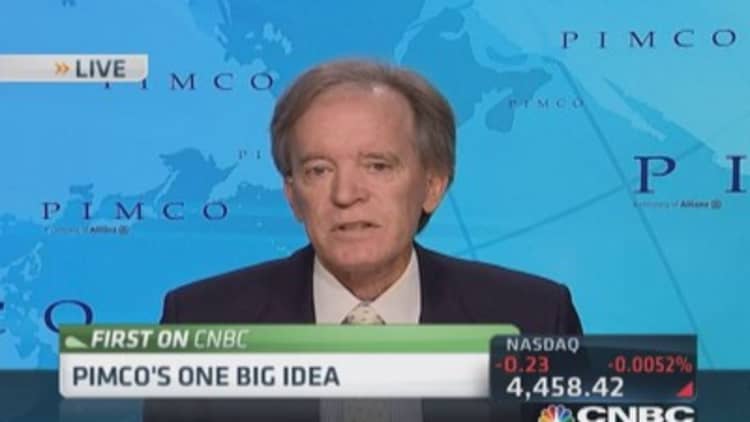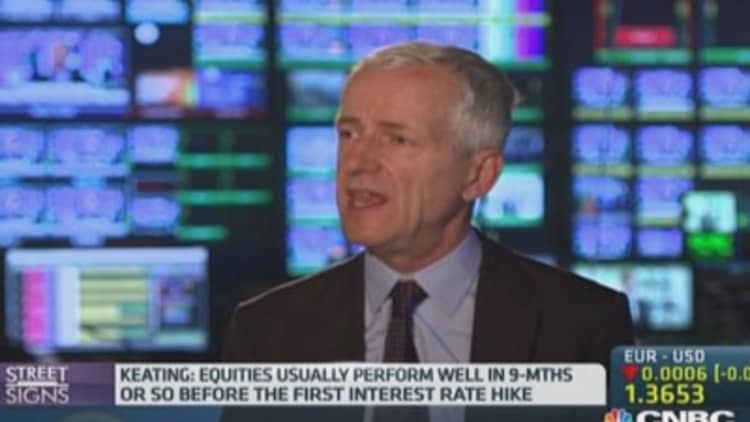
U.S. stock indexes are pushing through fresh records and valuations have passed pre-financial crisis levels, but some analysts believe markets aren't overvalued yet.
Sure, the S&P 500's valuations look high on historical standards, but it's really about ultra-low yields, Bill Gross, chief investment officer at Pimco, told CNBC Wednesday, citing Pimco's "new neutral" mantra that the neutral federal funds rate will be lower for longer.
"Based upon our assumption that this new neutral stays low, they're not as bubbly as some would suggest," Gross said.
Read More Yellen: Seeing pockets of increased risk-taking
"If fed funds going forward stops at 2 percent instead of 4 percent, which is historical, then [the Dow Jones Industrial Average, or DJIA] at 17,000 and high yield spreads at 350 basis points over Treasurys are attractive and are less bubbly than some would imagine," he said.
Helping to spur concerns over whether stocks are in bubble territory, the DJIA closed Wednesday at a record 16,976.24, while the S&P 500 ended at a fresh high of 1974.62.
In a blog post Wednesday, Gross said that the "new neutral" means "all financial assets might logically be repriced relative to historical experience."
Read More Can the Fed and Janet Yellen control bubbles?
While the S&P 500's 10-year cyclically adjusted price-to-earnings ratio, or CAPE, typically has predictive value of whether shares are overvalued, the "new neutral" indicates the CAPE's historical median valuation of 17 times earnings may need to adjusted to around 20-22 times, Gross said in the post.
That would mean the S&P 500's current CAPE of 25 times isn't terribly bubbly, he said.
Read More Roubini: No Stock Bubble, but 'Huge' Crash Could Come Later
Gross isn't alone in believing low rates mean the markets aren't too expensive, let alone in bubble territory.
"We don't think we are in a bubble in equities at all. Valuations at some kind of global average level are pretty close to fair," Giles Keating, deputy global chief investment officer for private banking at Credit Suisse, told CNBC.
In fact, the bank recommends going overweight on equities.

"We've added a little bit to our equity portfolios. We think that's where the risk reward is better," Keating said.
"We prefer Europe and to some extent Japan to the U.S., but we don't think the U.S. is crazy overvalued," he added. "If you look just at a 12-month forward price-to-earnings, it's pretty much in line with the 20-year average. People seem to think it's high because it's risen a lot from very low levels, but it's not high by history."
Read More Sovereign debt the 'ultimate bubble': Wilbur Ross
Goldman Sachs also expects low rates mean stock valuations can keep rising, but it isn't sure that's necessarily a positive.
"If real risk-free interest rates are sustainably lower than in the past, it seems reasonable to expect equity valuations to be higher than normal and perhaps to move higher still," Goldman said in a note dated Wednesday.
"The bad news is that the argument that equity valuations may remain high is essentially an argument that expected future returns will be low by historical standards," it said. "That is the dark side of sustained high multiples."
But it added, if investors are willing to accept those lower returns, the above-average valuations can be sustainable.
—By CNBC.Com's Leslie Shaffer; Follow her on Twitter @LeslieShaffer1

